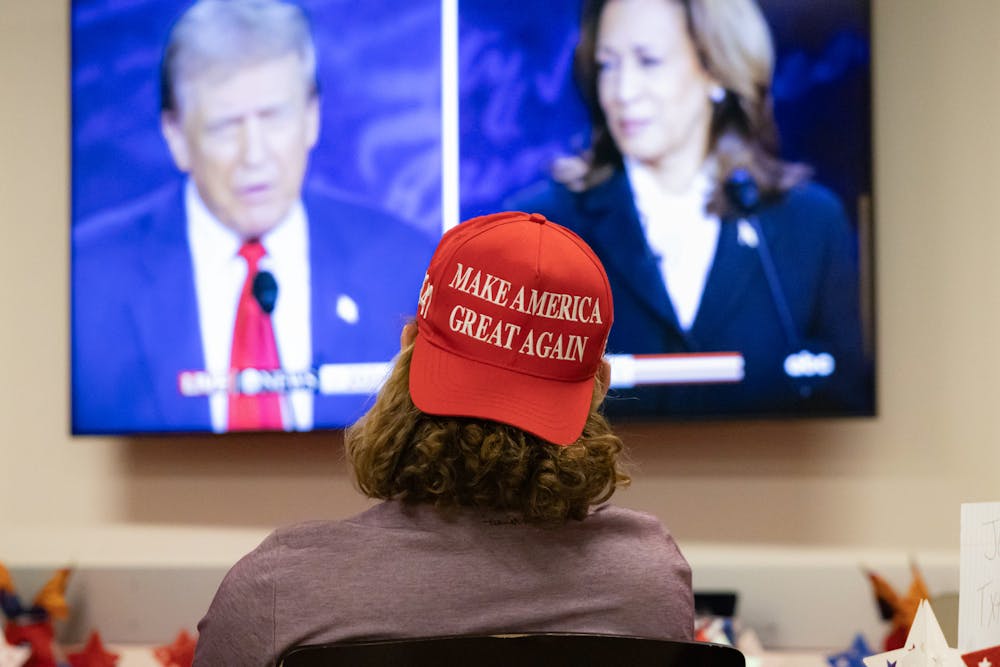The first Presidential debate held on Sept. 12 between Republican candidate and former President, Donald Trump, and Democratic candidate and current Vice President, Kamala Harris, sparked conflicting and universal takeaways from ASU students.
In the days following the debate, University students shared their thoughts on policies and performances. While opinions varied, many held a shared belief on the political division in the debate, along with the lack of true impact in changing voters' minds.
Sully Desta, a senior studying computer science, said he saw both candidates stoop to a level of combativeness that upsets him as a young voter.
"It was a lot of personal attacks, rather than policy and litigation actually being discussed, and that does kind of disappoint me," Desta said.
Similar sentiments were shared by Hannah Magick, a senior studying global health, who said she was frustrated by the unprofessional nature of the debate.
"The fact that they even had to mute the mics so they (Trump and Harris) wouldn't talk over each other," Magick provided as an example. "I don't want someone who can't wait their turn to speak to run our country."
However, students also said this air of unprofessionalism was broken by discussion of several policy issues especially pressing to young voters.
Brody Walker, a freshman studying data science, saw Trump's handling of questions revolving around taxation as a substantial reason why the former president came out on top.
On the other hand, Desta said he gravitated toward Harris' views and solutions for the border crisis. He said that "from personal experience," he's seen how immigration can be beneficial for society and in "growing neighborhoods."
"I just couldn't imagine a world where a lot of those (neighborhoods) get decimated based on more conservative border policy laws," Desta said.
Still, others also said they hoped to see more policy representation for certain issues they care about. Magick said Harris paid more attention to middle-class families and people with children during her performance, while attention to the younger generation was absent.
"I'm younger than that," Magick said. "I don't have a family like that, so I'm just like, 'Who's gonna take care of the student?'"
Nevertheless, all of these aspects, from discussion of policy to personal attacks, all contributed to a larger issue: the reinforcement of party divisions over efforts to bring in new voters, according to Magick, Desta and Jessie Nash, a freshman studying psychology.
This ability to maintain and grow a voter base will be crucial in Arizona. The state went to current President Joe Biden by about 10,000 votes in 2020, making it a key battleground for the candidates.
However, Desta said the results of the debate make it difficult to be optimistic about the election and beyond, no matter who comes out on top.
"I feel like right now, we're a lot more focused on conservatives attacking liberals, liberals attacking conservatives — and we're not actually focusing on policy to resolve things," Desta said.
Nash also said there's a concern about the growing divides between the parties, and the lack of efforts to bridge any sort of gap between voters.
"I think it's (the debate) just gonna drive each party further," Nash said, "Republicans are going to love him (Trump). Democrats are going to love her (Harris)."
Magick also said there was a lack of impact from the debate, refraining voters from changing their views.
"I think the people watching the debate are the people that already have their opinions, and I don't think any opinion is going to be swayed by it," Magick said.
Students also said the tactics used by both candidates were meant to bolster an established voter base, contributing to the divide the debate expanded.
Desta said that during Harris' performance, she appealed to many groups and was "saying the right things" in the debate regarding her approaches toward issues.
"She appeals to voters, she appeals to minorities especially, and that's really helpful," Desta said.
Conversely, Magick said Trump seemed to stick with the tactics and strategy that have become hallmarks of his political persona.
"We've seen him debate so many times already, and I feel like his attitude has been pretty similar," Magick said.
Still, Walker said Trump's consistent style of argument and past experience was a benefit for him in this year's debate.
"She's (Harris) kind of experienced, but I'd say Donald Trump has dealt with more stressful situations than her," Walker said.
University students express their beliefs on the performances of the debate, as well as concern for the current political landscape and their potential presidential elect.
"I definitely just feel like our candidates should be a little bit younger," Magick said. "I feel like these people do not have my best interest in mind."
Edited by George Headley, Abigail Beck and Madeline Schmitke.
Reach the reporter at sluba@asu.edu and follow @samluba6 on X.
Like The State Press on Facebook and follow @statepress on X.
Sam is a freshman studying political science with a minor in justice studies. This is his second semester with The State Press. He has also worked as editor-in-chief of his high school newspaper.




